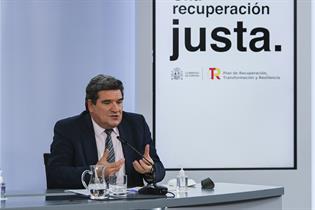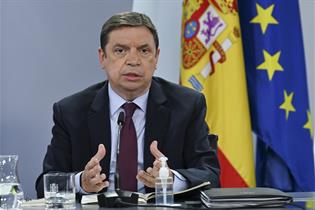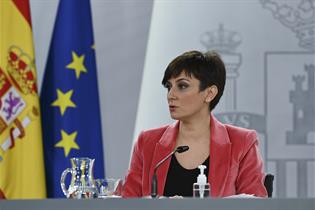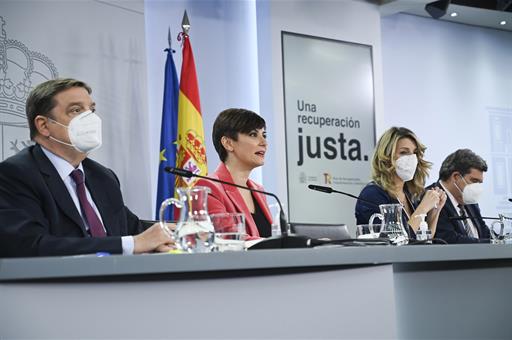Council of Ministers
The Government of Spain approves the labour market reform to put an end to precariousness and temporary employment
Council of Ministers - 2021.12.28
Moncloa Palace, Madrid
The Council of Ministers has approved the Royal Decree-Law that includes the agreement reached between the Government, trade unions and employers on 23 December to structurally reform the labour market.
The Second Vice-President of the Government of Spain and Minister for Work and Social Economy, Yolanda Díaz, has defended that the reform is "a national agreement" because it has been agreed with the social partners, incorporates workers from all generations and recovers the rights that they have lost in recent years.
Díaz added that the law "turns the page on labour precariousness in Spain", breaks with the "junk contracts" and improves the quality of work, which will have an impact on the improvement of public pensions.
Main measures
Collective bargaining
 Foto: Pool Moncloa/Borja Puig de la BellacasaThe regulation restores ultra-activity on a permanent basis. The conditions laid down in a collective agreement shall remain in force after the end of its express term.
Foto: Pool Moncloa/Borja Puig de la BellacasaThe regulation restores ultra-activity on a permanent basis. The conditions laid down in a collective agreement shall remain in force after the end of its express term.
The prevalence of the company agreement over other agreements is repealed. Yolanda Díaz pointed out that it could only be applied if the contractor or subcontractor had their own agreement that improved conditions in the sector.
The standard contract is the permanent contract
The vice-president stressed that the standard contract in Spain is the permanent contract, and the contract for work or service disappears: "We are moving to a single temporary contract in which we recover the causality, which has to be deeply motivated and restricted".
Díaz explained that there is only one fixed-term contract, which may be used due to production circumstances or the substitute of a worker.
On the other hand, the vice-president stressed that if companies are involved in any contractual irregularity with workers, they will become permanent members of staff. In addition, penalties and company infringements are individualised and will be up to a maximum of 10,000 euros for each worker affected.
Construction contracts and permanent-discontinuous contracts
In the construction sector, construction contracts become permanent. Once the work has been completed, the company must relocate their workers to another site or offer them training or requalification.
Yolanda Díaz also pointed out that permanent-discontinuous contracts have the same social protection rights as other contracts.
Training contracts
There are two types of training contracts: sandwich training and work experience.
The former can be arranged with people of any age, except in the case of the Catalogue of Professional Qualifications, with a limit of up to 30 years old, and with a maximum duration of two years. Remuneration will be adapted to the agreement and may not fall below 60% in the first year, and 75% in the second year, and will never be less than the Minimum Wage proportional to the working day.
Contracts for professional practice may be arranged up to three years after certification and have a duration of between six months and one year.
Public administrations and scholarship holders
The vice-president stressed that staff who join public administrations through selective processes cannot be dismissed. She also announced that the Government and the social partners are going to develop the Statute for Scholarship Holders. A specific occupational health plan for minors will also be implemented.
Overcoming labour market dysfunctionalities
 Foto: Pool Moncloa/Borja Puig de la BellacasaThe Minister for Inclusion, Social Security and Migration, José Luis Escrivá, explained that the labour reform aims to put an end to the existing dysfunctionalities in the labour market.
Foto: Pool Moncloa/Borja Puig de la BellacasaThe Minister for Inclusion, Social Security and Migration, José Luis Escrivá, explained that the labour reform aims to put an end to the existing dysfunctionalities in the labour market.
The first dysfunctionality is that Spain has very high unemployment rates due to the mismatch between what the labour market offers and workers' skills. The reform, the minister said, emphasises in-company training and provides public incentives for companies to invest in training.
"We have to leave behind the idea that Spain has to compete through wage devaluation. No. It has to work with more qualified workers and with more human capital", Escrivá remarked.
The second dysfunctionality is precariousness. To avoid this, the minister pointed out that the new rule discourages temporary contracts.
Excessive redundancies are the third dysfunctionality, the minister pointed out. Escrivá stated that "dismissal has to be the last option", because during the pandemic the usefulness of Temporary Redundancy Programmes (ERTEs), agreed with the social partners, has been demonstrated.
José Luis Escrivá explained that the labour reform simplifies the procedures for companies to take advantage of ERTEs. The ERTE for economic, technical, organisational and production reasons (ETOP) introduces changes to facilitate processing and application in small and medium-sized enterprises. In addition, the application of ERTEs due to force majeure is also caused by the impediment or limitation of the normal activity of the company due to decisions of the governmental authority.
On the other hand, the regulation contemplates the RED Employment Flexibility and Stabilisation Mechanism, which must be activated by the Council of Ministers, and which transfers what was applied during the pandemic to the labour market to protect wage income and the productive fabric in the event of an external shock.
The minister also referred to the sectoral ERTEs: "It may occur in some sectors, as a result of the need for restructuring, technological change, or a transitory situation in which the productive fabric and the workers have to be protected and redundancies are, once again, the last resort. And therefore, we are developing the sectoral ERTE, in addition to the cyclical ERTE and the company ERTEs".
The fourth dysfunctionality, cited by the minister, is the uncertainty caused by precariousness and unemployment, which has been alleviated by the agreement reached with the social partners.
Strength and legitimacy of the agreement
The Minister for Territorial Policy and Public Function, Isabel Rodríguez, highlighted the strength and legitimacy of the agreement: "Economic and trade union actors have fulfilled the constitutional mandate to look after the economic and social interest".
Yolanda Díaz and José Luis Escrivá also thanked the social partners and the technical teams of the ministries for their generosity and dedication throughout the negotiations.
CAP Strategic Plan 2023-2027
 Foto: Pool Moncloa/Borja Puig de la BellacasaThe Minister for Agriculture, Fisheries and Food, Luis Planas, has presented the Strategic Plan to the Council of Ministers for the Application of the Common Agricultural Policy (CAP), which the Government will send to the European Commission tomorrow for approval.
Foto: Pool Moncloa/Borja Puig de la BellacasaThe Minister for Agriculture, Fisheries and Food, Luis Planas, has presented the Strategic Plan to the Council of Ministers for the Application of the Common Agricultural Policy (CAP), which the Government will send to the European Commission tomorrow for approval.
Planas pointed out that the CAP is an instrument to support farmers and stockbreeders in the production of food and drink and to tackle the major challenges facing the primary sector, the agri-food sector and the rural world as a whole.
The plan has 47.724 billion euros allocated, which will exceed 50 billion euros if state and regional contributions are added. It also relies on funds from the Recovery, Transformation and Resilience Plan.
The minister stressed that CAP funds will be distributed in a more balanced and fairer way, unlike on previous occasions when only European regulations were applied. To this end, the number of payment regions will be reduced from the current 50 to 20: "It introduces, for the first time, the redistributive payment to support small and medium-sized farmers".
Luis Planas also stressed that it is a "greener CAP, which better respects the environment and contributes to the fight against climate change". It includes funds for soil conservation, water conservation, biodiversity, landscape and support for organic farming.
It is also a more social CAP because it favours generational renewal in rural areas. In this respect, Planas pointed out that two out of every three farmers and stockbreeders are going to retire soon and that the future of the environment depends on bringing in young people. The minister also argued that gender equality is a key element for the Government: "We have been pioneers, with the European Parliament, in defining the objective of equality in the next European Common Agricultural Policy and, therefore, we are going to give a premium of 15% of the aid for the incorporation of women farmers and stockbreeders".
Planas stressed that the future CAP also encourages innovation and digitalisation, which will result in improved farm profitability.
National Security Strategy Update
 Foto: Pool Moncloa/Borja Puig de la BellacasaThe spokesperson for the Executive informed that the Council of Ministers has revised the National Security Strategy approved in 2017 to adapt it to the current context marked by the consequences of Covid, the acceleration of the transformation caused by technology and the ecological transition, and greater geopolitical competition.
Foto: Pool Moncloa/Borja Puig de la BellacasaThe spokesperson for the Executive informed that the Council of Ministers has revised the National Security Strategy approved in 2017 to adapt it to the current context marked by the consequences of Covid, the acceleration of the transformation caused by technology and the ecological transition, and greater geopolitical competition.
New actions include the modernisation of the epidemiological surveillance system, the development of a Comprehensive Security Plan for Ceuta and Melilla, the creation of a Spanish Space Agency with a component dedicated to National Security and the incorporation of the Sustainable Development Goals (SDGs).
Other agreements
Isabel Rodríguez also referred to the presentation of the report on the 2022-2023 Primary and Community Care Action Plan, approved by the Interterritorial Council of the National Health System on 15 December.
In addition, the Council of Ministers has approved the National Programme for the Resettlement of Refugees in Spain for 2022, and has amended the Hydrological Planning Regulation.
Non official translation





